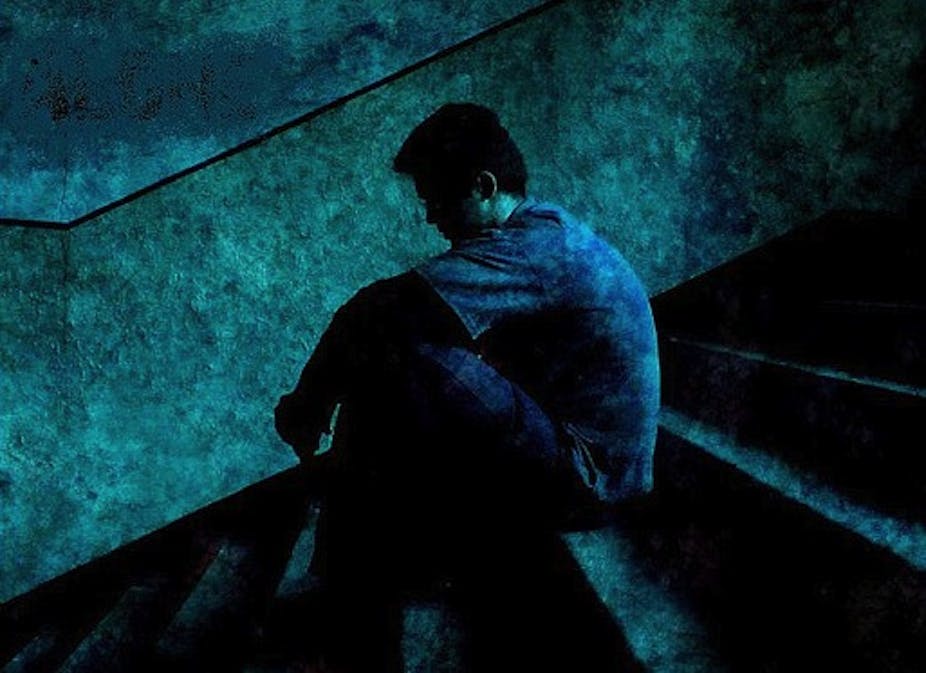Make a list of ten men in your life — perhaps your father, your partner, your friends, and some of your colleagues. It’s likely that at least one man on your list is struggling with the traumatic legacy of child sexual abuse. And the odds are that he’s suffering in silence.
I recently published a research paper that investigates how a history of sexual abuse can influence men’s experiences of fatherhood. Survivors of abuse speak of their fear that they will abuse their own children, their discomfort with displaying affection, and their overprotective parenting styles.
What’s most remarkable is that although a large number of Australian fathers are facing these difficulties, my research was the first to directly investigate this topic.
A loud silence
It’s not that nothing is said about child abuse. Over the past few years, we’ve seen much press on institutional cover-ups. And the perceived failings of child protection departments are a media staple. But when it comes to the lives of ordinary men wrestling with the trauma of sexual abuse, there has been relative silence.
Partly, this issue is hidden because much of the increased attention to the problems of child sexual abuse was generated by the awareness-raising activities of the feminist movement. While this has undoubtedly been a positive development, it’s also meant that sexual violence has come to be construed by many as an issue that only affects women and children.
Another reason the effects of sexual abuse on men is seldom addressed is that it challenges our culture’s traditional notions of masculinity, some of the key features of which are the expression of aggression and sexual prowess, self-reliance, stoicism, and even homophobia.
Because the act of sexual abuse commonly exposes boys to a sexual experience with another male and casts them as victims, it places them in a position that’s starkly at odds with the traditional masculine ideal. And the path to recovery often requires an emotional bravery and an openness to vulnerability that some continue to consider weak or “feminine”.

Cultural images of how “real men” should think, feel and act can create powerful barriers to male survivors of abuse disclosing their experiences to others, accepting their experiences as ones that may have had a formative influence on their lives, and healing from the trauma of their abuse. If we don’t challenge these cultural images, then our inaction implicitly supports them.
Discourse of blame
When it comes to fathers, my research found there are further reasons for survivors to keep their history of abuse hidden. Here the problem is not only silence, but also misinformation. Many male survivors are acutely aware of what has been called the “victim to offender” discourse; that is, the idea that a boy who experiences sexual abuse will almost certainly go on to perpetrate similar abuse.
This discourse is uncritically reproduced in the media, in government reports and publications, and even in the literature of child abuse prevention organisations. The website of one such organisation states that “95% of child abusers were themselves abused as children”, but gives no indication of what percentage of sexually abused boys do not go on to become perpetrators. It creates the impression that the passage from victim to offender is automatic.
The “victim to offender” discourse promotes a very one-sided interpretation of the facts. Research indicates that while certain childhood experiences, including neglect and sexual abuse, are associated with an increased risk of becoming a perpetrator of child sexual abuse, only a small minority of survivors go on to become perpetrators. Most men who were sexually abused as children wouldn’t dream of repeating such abuse – but many feel they will be treated with suspicion if they reveal their history.
We need to talk with and about male survivors of child sexual abuse, and we need to do it in ways that give men the space, support and encouragement to open up about their problems. Although there are a handful of excellent advocates and services for male survivors in Australia, they are fighting powerful cultural ideals and narratives that tell men, in many subtle ways, to keep their mouths shut.
We need to talk about male survivors of child sexual abuse, but we must do so sensibly. Too often when men are framed as the victims of violence, the issue is co-opted by what academic Michael Flood calls “angry men’s movements” (socially conservative, anti-feminist men’s rights and father’s rights groups) in whose hands the recognition of men’s pain can easily become an instrument of division, rather than an opportunity for understanding and healing.
We need to have these conversations because too many men — our fathers, partners, friends and colleagues — are currently struggling to deal with this awful trauma on their own.

